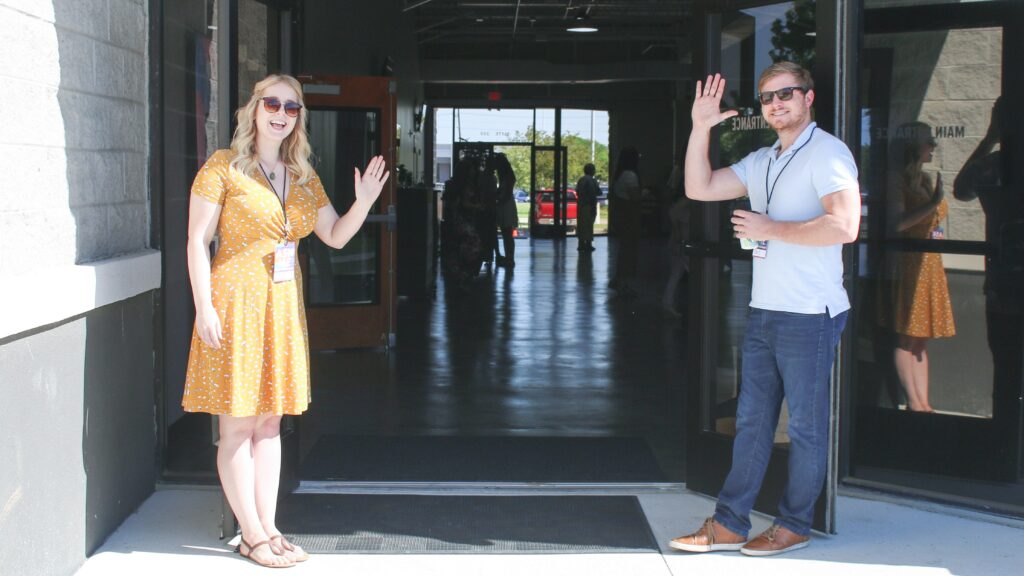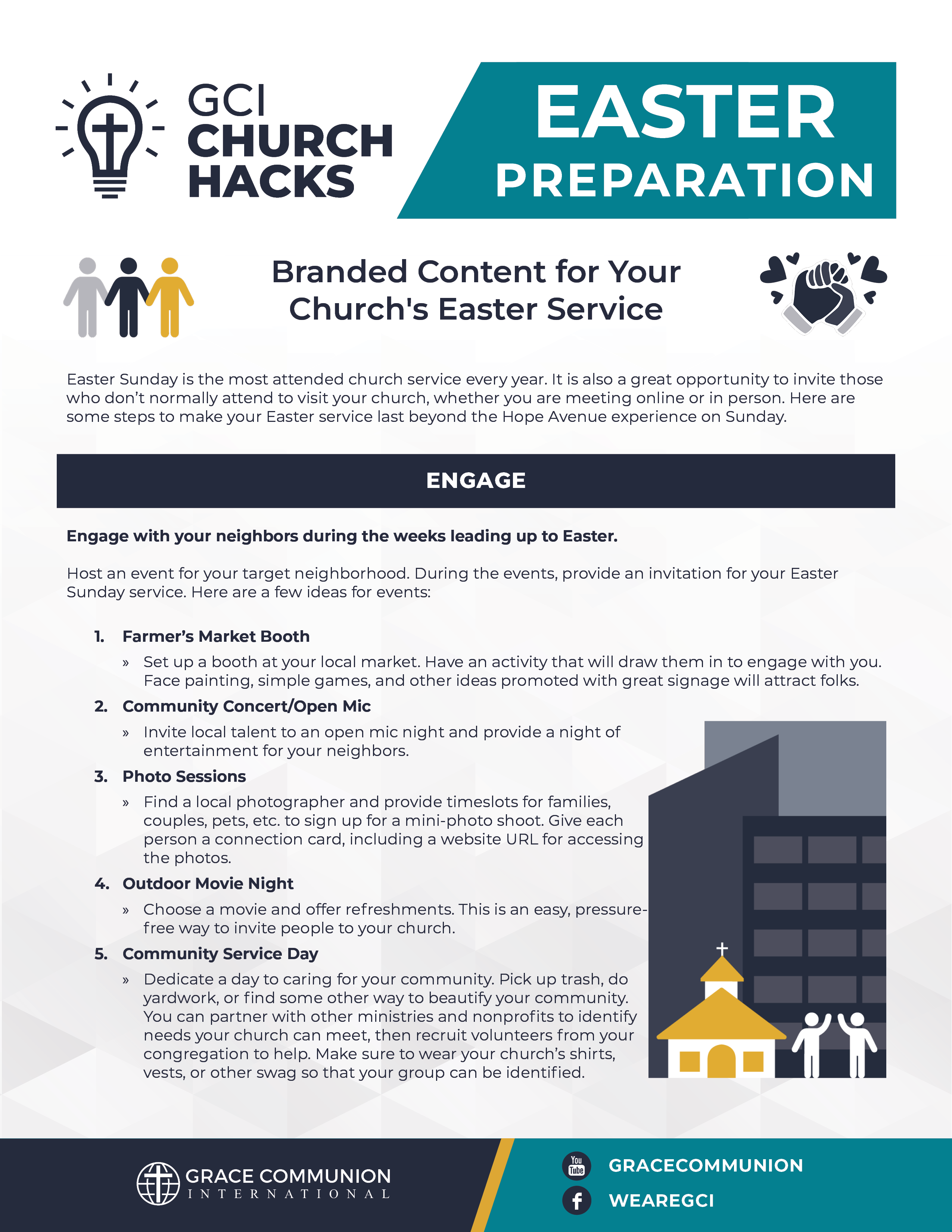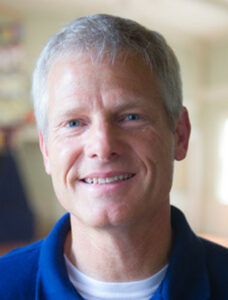Resurrection Fish Fry w/ Jeff McSwain
Welcome to the Gospel Reverb podcast. Gospel Reverb is an audio gathering for preachers, teachers, and Bible thrill-seekers. Each month, our host, Anthony Mullins, will interview a new guest to gain insights and preaching nuggets mined from select passages of scripture, and that month’s Revised Common Lectionary.
The podcast’s passion is to proclaim and boast in Jesus Christ, the one who reveals the heart of God, Father, Son, and Holy Spirit. And now onto the episode.
Anthony: Hello friends, and welcome to the latest episode of Gospel Reverb. Gospel Reverb is a podcast devoted to bringing you insights from scripture, found in the Revised Common Lectionary, and sharing commentary from a Christ-centered and Trinitarian view.
I’m your host Anthony Mullins. And it’s my delight to welcome this month’s guest, Dr. Jeff McSwain. Jeff is the founder and former Executive Director of Reality Ministries in Durham, North Carolina, a ministry which fosters friendships amongst people of all abilities marked by mutuality, authenticity, and the reality of Christ’s love for all.
He’s also in the process of launching a new ministry initiative called Experience Reality (which he may tell us a bit about.) Jeff is the author of two books, The Movements of Grace and Simul Sanctification. Ad his third book, Living to God, releases later this year. Jeff earned a PhD from St Andrews, where he studied with the likes of one of our favorite theologians here on the podcast, Alan Torrance.
And I personally keenly remember the first time I met Jeff, and we were talking over a meal, and I told him, I don’t know if he’s a theologian or a practitioner. And in saying that I knew he was both, which is a good place and space to be!
Jeff, thank you for joining us today. Welcome to the podcast. And for those in our listening audience, who may not be familiar with you and your work, tell us a bit about yourself. What are you up to these days?
Jeff: Thank you, Anthony. It’s a real joy to be with you. I consider you to be a dear friend. And I hate that we haven’t had a chance to hang out as much in recent years. But when I think of you, I think of you and Elizabeth, really as representing a whole slew of friends—just hundreds of friends from GCI in particular—who I’ve grown to know and love over the years. And so, if anybody from GCI is listening to this, know that I’m thinking fondly of you too, as I talk with Anthony today.
So yes, thank you for the introduction. I’ll tell you a little bit more about Experience Reality at some point, but I am really excited about the book coming out soon. During COVID (I guess we’re still in COVID, aren’t we?) but during those days when things were really shut down, I found some time to write and did feel the Spirit prompting me to write some things that I think will build on what I’ve written before.
I didn’t really set out to write any more books, but there’s something in me just compelling me in that direction, or someone in me compelling me in that direction, I’d like to think. So you mentioned the title Living to God. That title is actually—we’ve scrapped it as an overall title for the two books.
The two books that’ll be coming out in tandem are gonna be released in two different years, but they’re really two parts of the same work. And I had the brilliant idea of saying, let’s have a pithy arch-over kind of title, overwriting title for the other two titles. And my Cascade Books editor, Charlie Collier, was like, “Jeff, I think that’s a little too busy. I think you got too much going on there. You’ve got an overarching title and then you’ve got a title and a subtitle for each of the two volumes.”
And so, “living to God” is really the scarlet thread of the whole two volume set. And I’ll tell you why. But the first book is entitled, Hidden in Contradiction: Humanity in Christ Before, During, and After the Fall. And the second book is called The Goodness of Judgment: The Ministry of Christ’s Cross for a Hurting World.
So, we can talk more about the second volume, another time perhaps, but this whole idea of living to God is something that has really blessed me as it comes from Romans 6. The scripture says (in most translations) it says,
The death he died, he died for sin once for all; but the life he lives, he lives to God. [verse 10]
(I should know that verse since it’s, like I said, the theme of the whole two books, but anyway.)
The death he died, he died to sin once for all; the life he lives, he lives to God. In the same way, count yourselves dead to sin and alive to God. [verses 10-11]
That’s how most translations have it. But technically, it’s: count yourselves dead to sin and living to God, which gives it a lot more dynamic sense. It’s actually the same word that’s used when we’re talking about the quick and the dead. So, Anthony, I can say, you’re pretty quick. But in theological terms, what I mean would be, you’re quick in the sense that you are living to God.
And I believe that because every single person is created in Jesus Christ as Ephesians 2:10 says,
We are created in Christ Jesus to do the good works, which God prepared in advance for us to do.
(That verse gets left off of Ephesians 2:8-9 quite a bit.) But to think about that, to be created in Christ means that you are living to God. And the verse is encouraging us, Paul is imploring us to reckon ourselves as such. Reckon yourselves, therefore, consider yourselves therefore as dead to sin and living to God in Christ. I think there’s a lot of power in that because really the scope of that statement is one that covers all of humanity.
And so, the whole book is related to this idea that we’re created in Christ and that we are living to God. Of course, that’s not all that’s going on; there are the things that complicate that, but that really is the foundation. As Paul says in 1 Corinthians, there no other foundation [3:11.] And that’s the foundation that gives us as human beings our foundness in spite of our lostness.
Anthony: One of the complications that I think you address in the book and comes to mind as I hear you talking about this, sometimes what we see in other human beings and in ourselves, quite frankly, it doesn’t look like we’re living to God. And one of the topics you address in the book—and a subject you and I have discussed through the years—is the duplicitous behavior (and of course, subsequent fallout) we sometimes see in leaders in the Christian faith. We will sometimes say it’s a fall from grace, which really is a theological misnomer because if we could fall from grace, we’d all be in a heap of trouble. Right? And so, in some ways we’d fall into grace, but nevertheless, a lot of damage has been incurred by behavior of people with influence.
And we know the names recently: Ravi Zacharias, Mark Driscoll, Bill Hybels, Jean Vanier. And these are men of consequence because of their enormous reach and influence and the things they did for good. So, what are we to think of these men? How do we theologically process their actions, especially in the wake of the hurt they caused?
Jeff: Well, that’s the question of the day for all of us really. In some individual types of scenarios like those—all men that you mentioned—that’s the kind of the micro aspect of each human being, but it’s also true in our world at large. God created the world good and humanity, very good. And is that completely displaced by the fall? Or even once one becomes a Christian, is that displaced—falls from grace, is that an undoing of Genesis 1, as it’s been revealed in recreation (as someone maybe might claim after baptism or after giving one’s life to Christ or coming to faith) is there now all of a sudden, a return back to the pre-conversion state?
Are there two things going on? Are there two things going on in one space or do we have to have a kind of a replacement theory or a displacement theory? We often use that theory when it comes to conversion. I use the word (I used the color language, the language red and green, because they’re opposite on the color wheel) red to count for the flesh and for us as corrupted, fallen human individuals who are under the curse of original sin, and green to talk about the blessing that we have in our creation and redemption.
And oftentimes we have a tendency to think because of the fall, we’re nothing but red. And then we give our lives to Christ or come to faith, we’re nothing but green. So then when something like this happens, we began to wonder. Something like happens with one of these prominent Christian leaders who abuses someone or falls from grace in such a way that it’s absolutely horrific that many Christians would never, you would never see doing such a thing as this.
Then you have to ask the question, did they fall back into the red zone? And did they leave the green zone? Or are there two things happening in the one space? And that really requires us to go back to theological interpretation. Green is a predominant color in my book, obviously, because I use this as a way to try to communicate that there really are green and red dimensions in every human being.
It’s not a dualism, it’s more of a duality. And I use the word picture—I’m trying to use lots of word pictures. Somebody said recently, “I think, Jeff, you might have used too many.” I had three or four metaphors going on in my head in one chapter because of all the illustrations.
And that might be one of the weaknesses of my book. I don’t know, but I’m trying to give lots of illustrations to help pastors to be able to grasp these concepts. And the target audience is really pastors and armchair theologians. It might not be for the layperson directly, but hopefully pastors can translate it to their flock in such a way that can make sense and really help people to understand this duality that we have operating within us.
But the placemat, if you’ve ever seen like an elementary school craft where you take a whole piece of green paper and a whole piece of red paper. And you cut them into strips and then weave them into a placemat. They’re two wholes, the whole red piece of paper and the whole green piece of paper are there, but they’re woven into one piece, into one placemat.
And I use that in what I call placemat anthropology, to describe these two things that are going on. But it’s not just a green and a red aspect that are going on. It’s a total green. Remember there are two complete pages that exist in the one person. So, there’s a green and a total red, and this is taken from [Karl] Barth’s theology of the simul.
And he believes that there are two total men in the one man, or there’s the one man of the two total men. (And forgive the non-gender-inclusive language, but that’s the way he puts it.) So, we have to ask in a question, like Jean Vanier, for instance, what’s going on there?
The red is obviously really raging and has caused a lot of damage for Vanier, who’s now passed. But for his victims and collateral damage and trauma for them, that they’ll have to live with the rest of their lives. And it’s very, very serious. And it’s not something that can be just sloughed off because Vanier is totally green. But I believe in relation to—and forgive me for using that kind of language, totally green and totally red, for personifying it. But that’s the way that the language comes across in the book and hopefully helpfully.
But we have to ask the question, is Jean Vanier because of his wicked acts, nothing but wicked? Jean Vanier was really an inspiration to a lot of people in the community of people with and without intellectual disabilities. If you don’t know who Jean Vanier is—for instance, the Reality [Ministries] staff read every book Jean Vanier ever wrote.
And he wrote in collaboration with other folks too, like Stanley Hauerwas and others, to try to communicate the integrity and worth of every human being as created by God. And he was a man of peace and a man of gentleness, ostensibly. Is he those things? Well, in Christ, yes. In his flesh? Absolutely not!
And when that happened and when those disclosures hit the news, it was jolting. It was jolting for all of us in the Reality [Ministries] community who knew Jean Vanier, not just personally, but in his writings. And the double life of a man like this, it floored us.
It was one of those things where some people were like, I don’t even want to ever look at one of his books again, much less read one of his books. Maybe we should even burn his books. I don’t think anybody said that, but that was kind of the feeling that people had, the woundedness of feeling the wounds of those directly wounded by Vanier and grieving the victims’ losses at his hands.
It was one of those contradictions that you can’t even get your mind around. The extremes were so great. So, to make a claim that Jean Vanier was 100% good, but also 100% evil, and that those two things exist, not only in Jean Vanier, but in all of us. It doesn’t make all of us abusers in the same way Vanier was. It doesn’t make—if that’s true for a pedophile, it doesn’t make all of us pedophiles or et cetera.
But what it does do, is it allows us to take seriously some scripture passages that maybe we have spun in a different way before. When Jesus says,
If you who are evil, know how to give good gifts to your children [Matthew 7:11]
That’s a shocking statement! He almost acknowledging there that there is evil. He knew that was in a person and he didn’t trust us in our flesh. At the same time, he knew what was in a person in regard to how he had created us. And he knew that to be totally good. But what I find us doing a lot of times is trying to address these situations through more of a zero-sum construct, Anthony.
It’s like (and you and I have talked about this before) but it’s more like, let’s grade this based on percentages. And a zero-sum is when the two numbers equal a hundred percent. So maybe I’m 80% good and 20% bad, or 50% good and 50% bad, or whatever.
And that scale oscillates, but it oscillates according to what we experience and how we think of ourselves and how others might think of us. But those are dangerous grounds to base anything on because one day I might think I’m really up in the scale. Another day, I might think I’m really down. Some days, I might think I’m off the scale altogether, or we might think Jean Vanier’s off the scale altogether in the red direction.
And so, what do we do? Well to look at the two totals and recognize that each person is totally righteous and totally wicked, allows us to be able to theologically by faith recognize that those two things are true in every person. And yet they manifest differently in different ways and at different times and in different ages.
But to me that’s better. It’s like we have two choices. We can either spin our sinfulness. And make it better than it is. In other words, I’m something less than a hundred percent sinful. You follow me? So, we could either spin our sinfulness like that. Or we could maximize the two totals and know that there’s not a symmetry. They’re not equal, but that the two 100%s are actually asymmetrical.
I find the latter to be much better. Because then we’re not locked into a place when we do something grievous or when we catch ourselves acting in the flesh (thought, word, or deed), instead of saying, “Gosh, I can’t tell anybody about that because if I do, they’ll think I’m not even a Christian.”
So, it paralyzes us and keeps us from living transparent lives. And it really locks us into our own corner where there’s not that balm of confession that we really need, confession to one another and confession to the Lord. So, what we end up doing then is we suppress, we don’t want anyone to know, so we suppress, or we repress.
And then and this is a great quote by Elizabeth O’Connor. If you don’t mind me reading this, this is from the book. I think a couple things that you mentioned that you wanted to talk about, it might be fun for me to read a couple sections out of the book. Would that be okay? This is the first time I’ve ever done this publicly. So, if you see it come out in print and it’s a little different, that means the editor did something that probably made it better.
But anyway, she said, Elizabeth O’Connor says it this way,
By an awareness that we have more than one self, we gain “the detachment and distance that we need to name and understand all the happenings in us. It is a simple handle for identifying the contradictions and ambivalences that Scripture and Dostoevsky” present to us. “If I say ‘I am jealous,’” continues O’Connor, and it “describes the whole of me . . . the completeness of the statement makes me feel contemptuous of myself. It is little wonder that I fear letting another know when my own identity with the feeling is such that it describes the totality of who I am.” However, “if I respect the plurality in myself, [I] no longer see my jealous self as the whole of me.”109
It’s really critical, Anthony. And if we see these two selves at work, then when we do something really bad, it doesn’t define us completely. It’s still really, really bad. In fact, I often say, I’m getting ready to tell you how good grace is, but let me warn you, it makes sin really bad. But by this ability to recognize these two totals that are going on inside the one person, I can actually call that out within the safe confines of knowing that the green—the reality of who I really am in Christ—is deeper and wider and stronger than that. That gives me a secure place and a safe place to where then I can confess those things.
She goes on to say, and here’s the other warning she gives about not thinking of yourself as just totally good because this is the other factor going on that, that you mentioned in the beginning, these other factors are more than just living to God in Christ Jesus is going on.
The opposite imbalance results if we let the pendulum swing to the other side, notes O’Connor: “when we are identified with only the good in us, we exclude from integration the objectionable. It is kept out of consciousness and cut off from acceptance. Though at first glance it may seem a better situation to be identified with good than with evil . . . what we repress in ourselves, (and catch this last sentence) we will project onto the neighbor and try to destroy there.”
What we repress in ourselves, we will project onto the neighbor and try to destroy there. We have to be aware that both of these things are going on. To go too far in one direction or the other and to discount the total green, means grace is not as good. To go too far in the other direction and say, somebody is only 80% evil means sin is not as bad, but we have to keep those two together.
We can’t allow for the fact of a zero-sum game that puts us in the middle where grace is not as good and sin is not as bad. Does that make sense?
Anthony: It does. And it seems to me, Jeff, that one of the ways that we get an imbalance in this view is we will build others up and look at them as heroes, like the names of the men that I previously stated.
And then when we see the evil, the flesh being lived out, then suddenly it’s like the whole rug has been pulled out from underneath their humanity. And we don’t know what to do with it, as opposed to seeing that just look within, there is something raging within me. That is not what I want—me personally, Anthony Mullins.
Jeff: You, Anthony?
Anthony: Yeah, exactly. I know it’s a shocker. But that’s really helpful because, as you described Jeff, we tend to hide and not live authentic lives unless we can be honest in a way that has the highest Christology, the highest view of grace or else we will hide. And we will hide from ourselves and hide from others.
Jeff: Yeah. I think Barth talks about the fact that there’s the “wolf” in each one of us and when things happen outside of us—you know we have a lot of things going on inside of us; we know the “wolf” is active—but a lot of times we don’t act out in a way that on the exterior hurts people really badly.
But when we do, Barth talks about those are examples of the “wolf” getting off the chain. And I think the “wolf” gets off the chain sometimes in my life, for instance, when I get interrupted because then I can’t put my best foot forward. And all of a sudden, I get interrupted, and I’ll lash out or I’ll have a moment, where I’ll act in the flesh in such a way that I’m like, oh my gosh, what is that saying about what’s underneath? What is that volcanic eruption saying about what’s there?
For instance, in the book Caste, Isabelle Wilkerson talks about the fact that when it comes to racism, there’s a lot of things underneath. She talks about the toxins that are under the tundra in these remote sections that are starting to kill the deer, but nobody knows it until you see the by-products of it. The reindeer are dying well. What’s going on? There’s something underneath the soil. The same type of thing happens for us.
We see something like that where the so-called “wolf” gets off the chain, and we recognize that, oh gosh, there’s more there. What do I do with that? Do I want to look at that more deeply? Or do I want to ignore that and just hope that it was a one off?
And so, I think that you’re exactly right. This is something that can be really, really helpful in relation to building healthier lives as individuals, as persons. And also, just better church communities, better worldwide communities, as we consider that aspect of repression and suppression that leads to that projection that causes us to draw a real deep line of us versus them.
Anthony: Yeah. No, that’s good. And there is so much to unpack there. And so, what I encourage our listeners to do is when the book comes out, get it and wrestle with this view of anthropology. I think it’s a faithful witness and helpful in the discussion of what we do—not only with the duplicitous behavior of others—but ourselves and how can we rightly name that.
Jeff: Can I say one thing more about that, Anthony? Sorry to interrupt, but I don’t want the listeners to think when you mentioned the word anthropology a minute ago—yes, this book has a lot of anthropological implications. But I want folks to know how Christologically rooted it is.
In other words, it’s really more a book about Christology than it is about anthropology, but it’s a Christological anthropology. And it’s important to recognize that because everything that we’re saying about us as individuals, I believe is derivative from what we see happening in the person of Jesus Christ, the one who not only took on our sinful flesh in his assumption, but also who became sin, which is not anything that any of us, even in our worst moments could actually become, but he was made sin.
So that we might know that we are the righteousness of God. But the two totals that he took on as the “Righteous One” (capital R, capital O) and as the one who was made sin for our sakes, and who entered into that with one heart, he and the Father into this incarnational, salvific redemption, that those two totals were obviously at play in Jesus Christ life as well.
And not just at the cross, because I don’t think 2 Corinthians 5 is about just the cross. But as Calvin would say, Christ carried the cross throughout his whole lifetime. The whole point, being that at these moments of decision, you see Christ wrestling. Do I go with this? Am I … can I? He’s wrestling with the flesh.
What flesh is it? It’s the flesh that he assumed. It’s the flesh that we wrestle with. And every time we turn left in our sinfulness, Christ at every crossroads turned right. And he sanctified us as he went. But the point being is that he wrestled with these very things.
No temptation has overtaken us that is not common to man.
I would say that 1 Corinthians 10:13 verse, really Paul is talking about Christ. No temptation has overtaken us that is not common to Christ, the Son of Man, and therefore common to man, common to persons, common to human beings. And I think that we have to recognize that everything goes back to Jesus Christ and how God has revealed himself in the intimate way that he has in the Word becoming flesh and making his dwelling among us.
It all starts there. So, any anthropology that I do in regard to these two totals, if it’s not connected to Jesus Christ. (And perhaps we could talk—if you want to read how that ties into things like the Caledonian definition of Jesus Christ being totally God and totally man.) In my derivative of that, is that Jesus Christ also represents total true humanity and total false humanity in himself, as that branch is off from the original Caledonian formula or Caledonian definition of 451. But if we don’t know it comes from Christ, if any of the anthropology I’m talking about doesn’t come from Christ, it’s not worth anything, not worth one smidgen of value.
And I want to make sure before we talk about—I know we have some scripture passages that you said you want to talk about—but I really want to home in on this idea of the double movement of grace to prepare us for all the exegeses that we have time for. And because I think that this really frames everything that we’re talking about.
I can do that as we go through the passages. But I’ll also wanted to mention, (because I’m this way when it comes to the Spirit, I see things and I think, that was a divine coincidence) I was having a theology group with some of the Reality [Ministries] staff guys and some of the folks that live in our neighborhood, the North Street neighborhood. And this morning, we’re going through each of the essays in the book and talking about it.
And this one was entitled “Unshakable Participants.” And I thought as I was reading it to myself, I thought as I was reading it, this is what I should mention. As I’m thinking and praying about what to talk about in the podcast, what opportunities might arise, what questions might be asked, this, I thought, seemed pertinent to anything else and frames everything else in a way that might be helpful.
Do you mind if I read a little bit of that, Anthony?
Anthony: Go for it. We do need to get to the passages, but if it would be better on the front end, that’s fine. Let’s do it.
Jeff: All right. So, I don’t want to read too much, but at the same time, what you mentioned earlier about movements of grace, I think needs explanation so that we can then look at the passages and see how they fit in. Here’s a few paragraphs:
For example, imagine a big, leather-bound book laying open on a table. Let’s say the book’s title is, Humanity’s Relationship with God. The left-side page is humanity and the right-side page is God. Jesus Christ, as the mediator, is both pages in himself, representing humanity to God and at the same time God to humanity. Where, then, are we located? We may look at the “humanity page” and see nothing but Jesus Christ. But when we look again, we discover that our humanity is hidden in Christ’s humanity, written into his script. We cannot see it directly, apart from revelation. Only with the lens of the Spirit can we see our faithfulness to God inside of Christ’s; our obedience, worship, and service are all there, inside of Christ’s. Our life is there in the fullness of the Spirit, living to God in Christ.
We go wrong when, rather than see ourselves already in the story, we believe that we need to fit ourselves into it. It is as if we feel the need to insert a page with our name and script on it. We might falsely adopt the logic that Christ makes our agency possible, but that it is up to us to capitalize on what Christ has done by adding our page into the crease of the binding as deeply as we can.
At first, we might think we have succeeded. After all, the inserted page might look like it is a part of the bound manuscript. But when turbulence hits, and things go awry (when the book is turned upside and shaken vigorously) the page will fall out. Only what is bound remains. But we know this already, that is why we tried so hard to push the page deep into the crease of the binding. Deep down, we know that if we are the ones who inserted our own page into God’s story of our lives, our assurance is suspect and our empowerment in the Spirit strangled. The more convinced we are of our identity as bound in Christ (green), the more empowered we will be to break the bondages and addictions of the flesh (red). Unfortunately, undue emphasis is often given to the “how” of the latter than to the “who” of the former. Our life in Christ is properly about the who-who question, who Christ is and therefore who we are, before the how-to of breaking free of bondage and the addictions of the flesh.
That’s the double movement of grace in which we’re all included. And in the discussion, one of the Duke Divinity grads, who’s on our Reality [Ministries] staff, he said, “What I kept thinking of during this chapter,” or during this reading (I’m calling him the essays “readings” right now.) He said, “I just kept thinking about Jesus Christ being on that page. And me being so preoccupied with wondering if my name is in the book of life, but then it hit me. All the names are in the name of Jesus Christ, and that the joy of losing our lives and our agency to find our agency in its most personalized way in Christ is a life-changing discovery.”
All we need are those two pages and Barth calls this the “real law.” It’s the law of Christ. [Dietrich] Bonhoeffer calls it “the law of the real.” But this is what we use to interpret every single passage of scripture, is who is Jesus Christ? Who are we in Jesus Christ? Before we think about the imperatives at all, we really focus in on these indicatives. And so, all we need are those two movements and we discover ourselves in that way.
And I think every scripture goes back to that framework. So, I appreciate the opportunity, but I was gonna say that at some point, no matter what scripture we talked about. So, I thought let’s get the frame out there so we can start reading scripture in the Christological frame, which also defines our anthropology.
Anthony: Yeah, let’s do it. Let’s get to the “who” question in the five passages that we have to unpack together from the RCL:
- John 21:1-19 “Resurrection Fish Fry,” 3rd Sunday of Easter (May 1)
- John 10:22-30 “One Love,” 4th Sunday of Easter (May 8)
- John 13:31-35 “The New Commandment,” 5th Sunday of Easter (May 15)
- John 14:23-29 “Peace Be with You,” 6th Sunday of Easter (May 22)
- John 17:20-26 “We Are One,” 7th Sunday of Easter (May 29)
Let me read the first passage that we have this month. It’s John 21:1-9. It’s a Revised Common Lectionary passage for the third Sunday of Easter on May the 1st.
After these things Jesus showed himself again to the disciples by the Sea of Tiberias; and he showed himself in this way. 2 Gathered there together were Simon Peter, Thomas called the Twin, Nathanael of Cana in Galilee, the sons of Zebedee, and two others of his disciples. 3 Simon Peter said to them, “I am going fishing.” They said to him, “We will go with you.” They went out and got into the boat, but that night they caught nothing.
4 Just after daybreak, Jesus stood on the beach; but the disciples did not know that it was Jesus. 5 Jesus said to them, “Children, you have no fish, have you?” They answered him, “No.” 6 He said to them, “Cast the net to the right side of the boat, and you will find some.” So they cast it, and now they were not able to haul it in because there were so many fish. 7 That disciple whom Jesus loved said to Peter, “It is the Lord!” When Simon Peter heard that it was the Lord, he put on some clothes, for he was naked, and jumped into the sea. 8 But the other disciples came in the boat, dragging the net full of fish, for they were not far from the land, only about a hundred yards off.
9 When they had gone ashore, they saw a charcoal fire there, with fish on it, and bread. 10 Jesus said to them, “Bring some of the fish that you have just caught.” 11 So Simon Peter went aboard and hauled the net ashore, full of large fish, a hundred fifty-three of them; and though there were so many, the net was not torn. 12 Jesus said to them, “Come and have breakfast.” Now none of the disciples dared to ask him, “Who are you?” because they knew it was the Lord. 13 Jesus came and took the bread and gave it to them, and did the same with the fish. 14 This was now the third time that Jesus appeared to the disciples after he was raised from the dead. [NSRV]
Jeff, I couldn’t help but think of the movie Forest Gump when I was imagining Simon Peter jump out of the boat. If you remember the scene, Forest jumps in the water and he’s trying to swim to Lieutenant Dan, and here we see Peter doing something similar.
But as you’ve already mentioned, the primary question of theology and therefore the heralding of the gospel is: who is this God revealed in Jesus Christ? So, what do the actions, the words of Jesus in this passage tell us about the Triune God?
Jeff: What a great passage! It says it’s a third time and when you think about, there might have been an in-between encounter that Jesus had just with Simon Peter before this. 1 Corinthians 15 seems to mention, he appeared to Peter, so I don’t know if this is the one that Paul’s talking about or not.
But the point is that we all know that Peter is fresh off of these three denials. And we’ve taught lots of sermons about [how] the three denials match the three questions, and that Peter had oddly put his clothes on before jumping in.
I have some thoughts about this passage that relate to what we’re talking about. When I think of a fishing net, first of all, I think of a matrix. I think of the placemat. And I think of the fact that, here are these fishermen—remember when Jesus first stepped into Peter’s boat? He was like, get away from me, Lord, I’m a sinful man. And Jesus said, don’t worry about it. Sinful people are all I got to work with, so I’m stepping into your boat.
But the point from the very beginning, there’s this contradiction in Simon Peter that Jesus seeks to speak into. And, if you wanted to think about this in theological, metaphorical terms, you could think of the fact of that net representing the tangled and conflicted humanity of those men in the boat.
It’s interesting that, Jesus tells them, throw it over on the right side of the boat, and that there’s this abundance. There’s nothing on the left side, call that the red side. And then there’s this abundance on the other side. And the red side, it speaks to me as the bad tree cannot produce any fruit, nothing, no fruit. No good fruit can come from the bad tree. It’s absolutely nothing. We have nothing in our flesh to offer. Flesh gives birth to flesh, not the Spirit, and we have nothing to offer there.
And it’s interesting that, if you wanted to look at this as John does (he’s telling this story), there’s lots of layers to it. If you wanted to excavate some of the layers, we could talk about the fact that the flesh produces nothing but flesh. The bad tree produces nothing but bad fruit. There’s nothing.
Apart from me, you cannot do a thing. John 15:5
So, you’ve got that part. And then you’ve got this abundance. It comes from the other side, and that is in the abundance of the Spirit. It’s not a static red and green, at all. These are two determinations, two movements that are going in each of us at the degree of 180, Barth says. They’re absolutely oppositional to one another. And in the Spirit though, we go from green to green to green to green; we go from fullness to fullness to fullness to fullness. It’s not a zero-sum increase. It’s the increase of the fullness that we have manifesting in such a way that it goes from completeness to completeness.
That’s what Peter experienced and all those guys experience in this catch of fish. That’s the first thing. And yet Peter still puts his clothes back on, which to me symbolizes that he’s still living in the shame and in the Genesis 2 and 3, as opposed to the Genesis 1 account. He’s clothed with shame, just as God mercifully clothed Adam and Eve after their shameful acts.
And so, this is interesting. And yet when Simon [Peter] gets there, he is exposed by Jesus, but in the most tender and loving way, allowing him to be reconciled, not only to him, but to one another—the disciples to one another.
Can you imagine? They were asking about each other at the table that night during the betrayal. Was it me, Lord? Was it me? Pointing at each other, wondering who it was. And even now they’re probably blaming each other. You ran away from Jesus. You ran away from Jesus. What about him? And then Jesus says, don’t worry about him; he has his own story here at the beach, on the fish fry day.
There’s a lot going on here, but one thing I want to hone in on before we jump is these three questions. Do you love me? 1 John tells us that we love God because he first loved us.
I believe in creation—and Julian of Norwich says this plain as day, it’s a beautiful passage—that when God created us, he loved us, and we loved him. Now, of course, that’s the case. When God created us, called us very good, he loved us, and we loved him. And what my book title means when it says created in Christ, Humanity in Christ Before, During, and After the Fall, means that total green never diminishes. Original sin is bad, but it’s not as deep and strong as original belonging.
The Spirit is deeper than the flesh, and the green is deeper than the red, so to speak. And what that tells me is that when Peter says, Lord, you know that I love you, he’s actually speaking truth back to God as a representative of every human being. And when we speak truth back to God, to me, that’s repentance.
It’s repentance to speak truth back to God because we know we can’t make the truth by our repentance, but we can participate in it. So, “you know that I love you,” harkens back really to Peter’s true self, which always loves God. And my contention is that every single person—no matter how villainous or how demonic their actions are in the flesh—every single person is living to God, loving the Lord, living to God in Christ Jesus (which means it’s moving from Jesus to the Father in the Spirit), loving the Lord with all their heart, soul, mind, and strength.
Every single person is doing that unconsciously before consciously. That’s what the ontology of the vicarious humanity of Christ teaches us. And that cannot be short circuited. That’s happening! That’s happening for every one of these disciples. Peter now is participating in that, “Lord, you know that I love you.”
Then Jesus says, okay, you’re onto something here. Let me just remind you that there’s transformative actions that cannot help but issue forth from the identity that I’ve given you in myself. And of course, Peter’s life was changed. You see that in the first chapters of Acts; the turnaround is absolutely amazing! And it’s not just the resurrection itself. It’s the love! It’s the love that changes him. And so, to me that’s really where it all begins for Simon Peter and his ministry.
Anthony: We see (and I heard you mention it) abundance, “right side of the boat” abundance. Just take a moment, Jeff, and describe the abundance of our God that you see born in this passage.
What can we take away about who God is and his abundance?
Jeff: It’s funny that they count the fish, isn’t it?
Anthony: It is! 153.
Jeff: I don’t know exactly what that means, but somebody might know [or] do a numerical study on that. And come up with what that means for John when he wrote that, when he recorded the number that day or from that tradition.
But I don’t know, but I do know that’s a lot. And I really think that it actually gives abundance a bad rap in a way, because it only represents the unlimited abundance of what Paul talks about in 2 Corinthians when he is talking about, from glory to glory [3:18]. One degree of glory to another sounds like a zero-sum game, but the actual words are from glory to glory, transformed into his likeness from glory to glory, likeness, image, likeness.
He talks in that same area of 2 Corinthians about Jesus Christ is the image of God. We’re created in the image; we’re created in Jesus Christ. And the abundance that comes from just who we are in Christ—which is the same as who we are in the Spirit. There’s never a point where, who we are in Christ is the foundation, and then we have to add the Spirit in later as if the Spirit is an add-on. It goes back to the idea that to do that is to diminish the homoousion, the oneness of being between the Son and the Spirit. Who we are in the Son and who we are in the Spirit are not two different things.
Fullness of the Spirit is included in the total righteousness that we have in Christ. It’s not that we’re a gas tank on half full, and that then grows up to—that’s taking a worldly metaphor and undercutting the totality of who the Spirit is and how she has given us this abundance and the fullness that has been poured out on all flesh, as Pentecost bears witness to.
So, yes, this is abundance, baby! This is more abundance than we could shake a stick at. This is more abundance than we could imagine.
No eye has seen, no ear has heard, no mind can understand what God has prepared for those who love him. [1 Corinthians 2:9]
I used to think, okay am I one of the ones who loves him? And then I began to realize, yes! Because of what Jesus Christ and his vicarious humanity has done for every single human being, I love God. God loves me, and I love him. We love God because he first loved us is a literal statement. It’s not that God loved us first; now it’s up to us. Let’s see if we can love him back.
No, we love God because God first loved us. That is the ontology. It starts with God. And then it’s a reciprocal human response to God in the mediation of Christ. That is the template for every single human being and every single human relationship, every single human action.
Anthony: And there it is.
Jeff, let’s move on to our second passage, which is John 10:22-30. It’s the Revised Common Lectionary passage for the 4th Sunday of Easter, May 8.
Brother, would you do us the honors of reading this particular passage?
Jeff: Alright.
22 Then came the Festival of Dedication at Jerusalem. It was winter, 23 and Jesus was in the temple courts walking in Solomon’s Colonnade. 24 The Jews who were there gathered around him, saying, “How long will you keep us in suspense? If you are the Messiah, tell us plainly.”
25 Jesus answered, “I did tell you, but you do not believe. The works I do in my Father’s name testify about me, 26 but you do not believe because you are not my sheep. 27 My sheep listen to my voice; I know them, and they follow me. 28 I give them eternal life, and they shall never perish; no one will snatch them out of my hand. 29 My Father, who has given them to me, is greater than all; no one can snatch them out of my Father’s hand. 30 I and the Father are one.” [NIV]
Anthony: Based on what you’ve already said, Jeff (in part you’ve already answered this), but the way we read this passage, Jesus said that the Jews don’t belong to his sheep.
So how do we reconcile the statement when our theological imaginations want to believe that every person belongs to God? What do we do with it?
Jeff: They’re definitely not acting like his sheep. They’re getting ready to slaughter the shepherd! It’s interesting. I think that the way Jesus talks—he also says the Pharisees are children of the devil; they’re not children of Abraham. He uses this kind of hyperbole to let people know that, of course they’re children of Abraham, the Pharisees. But he uses this hyperbole. (And he says that even later in that same passage in John 8, I think.)
But the point is that when you’re not acting like it, your actions—is Jean Vanier wicked? Yes! That’s not all that we can say though, about Jean Vanier. And so, when you adopt this Christological anthropology as the lens with which to read scripture, then we can say, in their flesh, they’re acting like children of the devil. They are children of the devil. They are not; they don’t belong to Jesus.
They’re the types of people that come up to Jesus and say, I did this in your name and that in your name. And it says here, Jesus does these miracles in the Father’s name. They say, I did this in your name and that in your name. And Jesus said, get away from me. I never knew you. [Matthew 7:22-23]
He doesn’t know them in the flesh, in a sense. He doesn’t know them in the flesh because that’s not who they are. The flesh is only parasitic to the indicative truth of who we are in Jesus Christ. And Jesus draws those delineations quite often. And they’re meant to show the severity of the anti-reality, the antichrist. Sometimes I might say the unreality, but “unreality” sometimes can communicate that the bad things aren’t really happening or that they don’t hurt. No! They hurt like hell, but that’s because of the good news or the indicative in contrast to that. Yes, it hurts. The contrast is painful and deadly.
And this is an example of people who should have known better, who are actually hurting the sheep who are following Jesus, because they are acting in such an antichrist way. And their father is the devil in these existential actions; they’re showing this is the “wolf” off the chain.
They’re showing the flesh in the way that Jesus is here to eradicate such thing. That’s why he came, in order to destroy sin, death, and the devil. In Romans 6, right before the passage of living to God, it talks about our old selves were crucified with him [verse 6] (that goes along with Galatians 2:20).
We can live out of one or the other of the two totals. If I stand up in front of you and say, I’m a 100% righteous, I’d get laughed out of the room, especially by people who know me. But if I stand up and say, I’m a 100% evil, I’d get laughed out of the room too. That’s not what we see, like you said, but our actions do manifest from the two totals.
If we walk by sight and not by faith, we won’t get it. We’ll judge people by their actions and define them by their mistakes. And so, Jesus is not doing that here. He’s not making an ontological claim about these people. And if it is an ontological claim, it’s the pseudo-ontology, the anti-ontology because as Barth says, there is no ontological godlessness. Absolutely not!
The only godlessness that can happen is a pseudo-ontology at best, which would be just very, very deep, deeper than we can fathom, more evil than we could ever comprehend, but not as deep as grace.
And where sin increases grace increases all the more. [Romans 5:20]
So, it always has to be in that asymmetrical relation. And I think that, when Jesus is talking about the sheep, he’s not talking about it in categorical terms, in terms of who’s a sheep and who’s not. Who’s elect, and who’s reprobate. He’s talking about it more in terms of how this is playing out and calling them out on it.
When he says he doesn’t know these people who are doing these things in his name (to use that other passage,) he knows them on his terms. He knows them on terms of grace. He knows them on terms that they are created in Christ, living to God. And here Jesus Christ himself, of all people, knows that. But he also knows—because he knows that so well—he also knows sin really well and sees the contrast and calls it out when he sees it.
And that actually is a real blessing. If we can really get into our bones, how good grace is, we’ll be better able to call sin out in ourselves and see it in the world. It’ll be more exposed; the contrast will be more apparent. There’s not a lot of contrast in a zero-sum game because the line’s so arbitrary and it just gets mixed together.
But in a total-total—as Barth would say, the old man from top to toe and the new man from top to toe—then all of a sudden you see this conflict. But as Barth would say, it’s not a hopeless conflict or else we wouldn’t even have this conversation. But he [Barth] says, “I was and still am the old man. I am and will be the new man.”
We’re both of those in the present, but I was and still am the old man; I am and will be the new. But the two present tense “I am” statements in this life were together. They were together for the Pharisees. They’re together for these people in this passage. They’re together for every one of us now. They were together from Genesis 2:4 on, in my opinion. And that’s part of what I write about in the book.
Anthony: “The Father and I are one.”
Jeff, that feels fairly weighty, and we have talked about it. Anything more that you want to add about the oneness, the sameness, the substance of Father in Jesus.
Jeff: Of course, I always go back to TF Torrance and the Torrances. Studying under Alan, of course, I asked him if I could do it on his uncle and his dad, JB. And he was kind of shy about it, and he goes, yeah, that’s fine. I think Alan’s his own theologian and his own thinker.
But it was a privilege for me to be able to do my work under Alan, and I have the highest regard for him. I think about [how the] Torrances talk—and I’m sure other people who’ve interviewed, probably talk about Torrance—about there is no God behind the back of Jesus Christ. There’s no God behind God, back in the shadows with a frown on his face. And Jesus is the nice guy with a smile on his face. We really have to be able to trust that the God we see in Jesus Christ is God. And the Yahweh of the Old Testament is perfectly revealed to us in Jesus Christ, the God who created the world, who came into the world and the world didn’t recognize him.
The light that gives light to every person was coming into the world. This is the God who became flesh. And so that we could know what God was really like. And that wiggle room that often gets inserted between who God is and who Jesus is, has to go away. And that’s why Jesus says, guys, quit asking me to see the Father; he who’s seen me as seen the Father. And to really be able to trust that picture.
That’s also why, oftentimes, I call TF Torrance—and I came to Barth through TF and JB’s work—but I often call TF and JB, the godfathers of Reality Ministries, because it’s this whole paradigm that we’re talking about, this folding into the relationship that Christ has with the Father. The oneness that they have, that Jesus then, by adoption, we get to be included in his Sonship.
So, we’re not just included in God in a vague way. We’re included in the Son of the Father and in the Holy Spirit. And so, through the vicarious humanity of what Christ does in representing us, we really are able to enjoy that unity and oneness that’s derivative of the unity and oneness that Jesus has with the Father and Jesus has with the other persons in the holy Trinity as Son of God.
So yes, that oneness is critical, Anthony. And if we get away from that, then we come into all kinds of terrible theological train wrecks, about Jesus loves me, but I’m not too sure about God. Or maybe God loves me because Jesus loves me, but not really directly. Maybe he tolerates me because Jesus loves me, or Jesus died from me. But yeah, we could get into all the different bifurcations that come into play when it comes to getting rid of our or interpreting anything less than what the Nicene Creed calls the homoousion, the oneness of being between God the Father and the Son.
And then of course, Athanasius’s letter to Serapion is very clear that the homoousion is also related to the Holy Spirit. And that’s very critical for us in regard to this understanding of the total of who we are as human beings in Christ: we are full of the Spirit. We’re not just in Christ, but someday, maybe full of the Spirit.
And any expressions of fullness that we see, in those moments where we feel full of the Spirit. Or we say, that guy is full of the Spirit. Or we have a feeling in ourselves that we’re full of the Spirit. That’s the fullness that’s manifesting. It all comes from this idea of the real unity that we have by grace in the Son of God, which is derivative of that same unity that the Son has by nature with the Father.
Anthony: As I’ve heard said, everything hinges on it. Amen and amen.
Our next passage is John 13:31 – 35. It’s the Revised Common Lectionary passage for the 5th Sunday of Easter on May the 15th. And it reads:
31 When he had gone out, Jesus said, “Now the Son of Man has been glorified, and God has been glorified in him. 32 If God has been glorified in him, God will also glorify him in himself and will glorify him at once. 33 Little children, I am with you only a little longer. You will look for me; and as I said to the Jews so now I say to you, ‘Where I am going, you cannot come.’ 34 I give you a new commandment, that you love one another. Just as I have loved you, you also should love one another. 35 By this everyone will know that you are my disciples, if you have love for one another.” [NRSV]
Jesus didn’t say, you will know my disciples by their influence. He didn’t say, you will know my disciples by their pious stands and culture wars. He didn’t say, you’ll know my disciples by their admiration and use of strength in geopolitical scenes. Jesus said, you will know my disciples if they love one another.
Jeff, what do you want to say about this?
Jeff: Let’s start out with just the premise again: the Lord loves us, and we love the Lord. That’s the ontology of it. It also means that we love our neighbors, one to another. That love is also the ontology of it.
And all reconciliation then has to happen from reconciliation. It’s not a hypothetical. We start with reconciliation to move towards reconciliation. And so, when it comes to this idea of loving God and loving one another, we can start with that.
Jesus says later in John 15, that he dies for his friends. And in Romans 5, Paul talks about the fact Christ died for us while we were sinners and while we were enemies. So, are we friends or are we enemies of God? It says he dies for his friends. Another place says he dies for his enemies. Yes, doggone-it! He died for his friends because they turned into enemies, but they never have stopped being his friends.
And in this world, we’re enemies with one another in many ways. White people have been the enemy of black people in America. Full stop. And you wouldn’t blame any person of color for not trusting a white person in what they say or do. You wouldn’t blame them. Any time there’s a mutual relationship attested by both sides of friendship, then that’s the created and redeemed order manifesting.
But we have to also call out the many, many ways (macro and micro strands of the red) that we see that have kept us from that love that we have from one another and have destroyed a lot of—have been antithetical and anti-Christ actions and need to be repented and confessed in such a way that more of the indicative truth, the ontological truth of who we are in Christ, who we are with one another, can be manifested in this world in a way that brings hope and healing and can be the balm of Gilead on the wounds of so many that have been wounded by the “us versus them” economy of evil.
Anthony: Amen and amen.
John 14:23 – 29 is our next passage from the lectionary. It’s for the 6th Sunday of Easter, May the 22nd. And it reads:
Jesus answered him, “Those who love me will keep my word, and my Father will love them, and we will come to them and make our home with them. 24 Whoever does not love me does not keep my words; and the word that you hear is not mine, but is from the Father who sent me. 25 “I have said these things to you while I am still with you. 26 But the Advocate, the Holy Spirit, whom the Father will send in my name, will teach you everything, and remind you of all that I have said to you. 27 Peace I leave with you; my peace I give to you. I do not give to you as the world gives. Do not let your hearts be troubled, and do not let them be afraid. 28 You heard me say to you, ‘I am going away, and I am coming to you.’ If you loved me, you would rejoice that I am going to the Father, because the Father is greater than I. 29 And now I have told you this before it occurs, so that when it does occur, you may believe. [NRSV]
And Jesus said that those who love him will keep his word. Okay. But on this side of the veil, new heaven, a new earth, all of us are falling short at keeping his word fully, subjectively, based on the way we see it. Though, you’ve already addressed that we are living to the Lord faithfully on the green side.
When we look at the depths of who we are, sometimes it feels like we’re not very pious. Paul talked about this thing that’s raging within him, that which he wants to do, he doesn’t do. And that, which he doesn’t want to do, he does. So what else is there to say about this, as we think through this particular passage?
Jeff: First of all, that Roman 7 passage is key. I do as the red self what I, as the green self, do not want to do. It’s the single subject there. You can’t lose the single subject of the two selves. My true self doesn’t need to repent, but my false self can’t repent. So, who has to repent? Jeff.
That’s the basic, bottom line. You can’t let the two selves fall apart into abstractions. They’re always considered within the one self, the one person of the two selves, the two selves of the one person.
And I think that Jesus is saying in these passages and John, like I said, is so nuanced here, but this is throughout scripture. Whoever does not love me does not obey my commandments. That’s exactly what we’ve been saying. Flesh gives birth to flesh. Flesh doesn’t love God. My red self doesn’t love God. My red self actually hates God. My red self is evil. My red self is the antichrist. So of course, that’s the case: whoever does not love me does not keep my commandments.
Whoever loves me, keeps my commandments. In other words, that’s the true self that we have. That is the person who obeys because Christ is obeying for us and therefore, whatever Christ is doing for us, we are doing with him. It’s not a hypothetical. It’s not a de jure, de facto. It’s not an objective that needs a subjective.
It’s not, let’s add the Spirit to it to make it actual. No, it’s all happening. It’s all happening in Jesus Christ. It’s all happening in ourselves as united with Jesus Christ. Those two things are going on. So what Jesus said there is imminently the case. What that means is when we go to war against somebody, we are killing our friends.
We are killing our friends. We are therefore also killing ourselves because to do violence against the economy of Jesus Christ in his vicarious humanity, is not just hurting Christ or breaking his laws. Because we are so intimately involved, we’re actually doing violence to our very self. We wouldn’t be able to say we were doing violence to ourself unless we were already intimately involved.
But because we’re so woven into it, and as Jillian of Norwich says, because we’re so knit in this knot with Christ, that anything we do with him is from him sourced in the vine, through the branches. Anything we do against him is the branches that are cut off and burned and thrown into the fire and destroyed. But Jesus Christ comprehends all of those aspects in his one person.
So, to go to war and to kill other people out of an “us versus them” mentality is to hurt Jesus Christ but is to hurt ourselves and is to kill our friends. If we started thinking of it in that direction, what it means to live in this world—and of course, Christ said, you’re gonna hear wars and rumors of war for a while. It’s gonna happen.
In this world, you will have tribulation, but be of good cheer, be encouraged for, I have overcome the world. [John 16:33]
Past tense. These two things have already been settled. They were settled in Genesis. They were revealed in Jesus Christ and now they’re being played out on the world stage and in the world stage of my home at 309.
But these things are being played out in such a way that we have a better framework to address just how bad sin and evil are. And also, to be able to address the brokenness of those who have been subjected by other people’s antichrist agency to lives of pain and oppression.
Anthony: Yeah, as you’re saying this, Jeff, we’re talking about war and rumor of war. And of course, right now, as we record this, there’s a war going on. And you’ve addressed this, that in war, nobody wins. Harm is done to the victim and the victimizer because we’re doing damage to ourselves.
So, what does that say about the peace that Jesus talks about in this pericope? He says he gives us his peace. What do we make of it? When it doesn’t look anything like peace right now, what do we do with it?
Jeff: Yeah. And when you think about just war doctrine, is there such a thing? You have to ask that question? Is there a way to get to the peace that is the reality? Again, we start with the fact that everybody knows God in Jesus Christ. And nobody knows God in the flesh. No one knows God.
And Jeremiah 31 points to the fact that they will all know me because the reality will be made manifest. They all know him in Jeremiah 31. They will all know him because they do all know him, but nobody knows the Father except the Son. Nobody knows the Son except the Father.
This is the baseline. And therefore, as Christ shares his knowledge of the Father with us, and we also with each other are sharing that knowledge. We can, as believers recognize that there is peace in that God is keeping truth with humanity. Humanity is keeping in the Son and the Son as humanity is keeping truth with the Father, there is Shalom.
There is peace and there is truth. There is truth and there’s grace and truth there. It’s not that Moses brought truth, and then Jesus brought grace. Moses brought the law, grace and truth came through Jesus Christ. That’s the mutual relationship of knowing one another in Christ, the mutual representation. The mutuality of loving one another in Christ and the mutuality of peace with one another are all rooted in the fact of what is real.
We live in a world where no matter how unreal, anti-real, and tragically manifest the events are, that we can live in the knowledge that it has not displaced or replaced the reality. The kingdom of God is still a dimension that’s in us and with us and that we are in. And that Hebraic understanding of holistic worldview has to be maintained in order to recognize that these are dimensions, as contrary as they are to one another and as painful as they are, they are dimensions.
And there is a reality, a winner in Jesus Christ as savior and Lord of all, the one who is peace personified.
Anthony: Yes, that’s good. Thank you for that.
And Jeff, hang with me little bit; we’re in the home stretch, man. One last pericope is John 17:20 – 26. It is the Revised Common Lectionary passage for the 7th Sunday of Easter, May the 29th. And it reads:
“I ask not only on behalf of these, but also on behalf of those who will believe in me through their word, 21 that they may all be one. As you, Father, are in me and I am in you, may they also be in us, so that the world may believe that you have sent me. 22 The glory that you have given me I have given them, so that they may be one, as we are one, 23 I in them and you in me, that they may become completely one, so that the world may know that you have sent me and have loved them even as you have loved me. 24 Father, I desire that those also, whom you have given me, may be with me where I am, to see my glory, which you have given me because you loved me before the foundation of the world. 25 “Righteous Father, the world does not know you, but I know you; and these know that you have sent me. 26 I made your name known to them, and I will make it known, so that the love with which you have loved me may be in them, and I in them.” [NRSV]
Whew! That’s some theological density there. So let me give you just a chance to rift. What is the Lord revealing in and through this passage?
Jeff: First of all, what does he say there? The world does not love me. The world does not know me. The world does not. We recognize that John’s use of the word “world” is a world in conflict. He’s not talking about the new heavens and the new earth or the original heavens and earth.
He’s talking about the reversal of, or the corrupted nature of the way things are, the world. And there’s beauty in that to me in the sense that, God so loved the world. In other words, even if the world can’t love God, the flesh can’t give birth to [Spirit], the worldliness, the sordidness of our flesh can’t love God, God loves us in the flesh. He doesn’t just love our true selves. He loves us.
He loves us warts and all, and he’s embraced us at our very worst. And that’s why I love that leper story in Mark 1, (we won’t go into it) Jesus embraces the leper at his very worst. He doesn’t heal him first and then say, come give me a hug! He embraces him, touches him before he heals him.
God so loved the world. That is the same love that the Father has for the Son that he has for each one of us who are adopted in the Son (ergo, every human being as Ephesians 1 says, anybody who’s adopted in the Son—and that would be all, according to my interpretation of Ephesians 1:1-10—has been a child of God from all eternity.)
And I think that there’s a matter of revelation now to be had—it doesn’t look like that—but these 12 apostles are the ones in the room and at this time, they represent not only Israel in the 12 tribes in a representative fashion, but they really represent humanity.
And the church also should be a provisional representation of all human beings sanctified in Christ. They are the ones that want to follow the head of the whole human race, and therefore have been called the body of Christ in scripture. But that doesn’t mean that the body of Christ is any different ontologically than every other human being outside the so-called walls of the church. We start with the fact that we are all included in Jesus Christ, by creation and redemption, and he is the head of the human race.
And our desire then would be to live in tangible expression of that. And that to live as the body of Christ, as Israel was called to do, as we are called to do. Not in a supersessionist way as the church, but in a way that the church and Israel are meant to bear witness, bear witness in a way that bears relative witness to the truth for all humanity.
And so, I just think that when it comes to this idea of knowing nobody knows the Son, except the Father, nobody knows the Father, except the Son that we have to recognize that we’re all inside of that by virtue of the vicarious humanity of Christ. And that in any place in our life where we give testimony to the fact that I really began to know God or that’s when I knew God, we can recognize that not only has God known us, but we’ve known God as well, if we take the vicarious humanity of Christ seriously.
And the reason that those “born from above moments” are so powerful and so visceral is because they’re rooted in reality, not because they’re creating the reality. And that’s why I’ve always been an evangelist at heart, I love to preach the gospel because I love to see those moments of discovery and recognition that are truly transformative.
And that will really allow us to be able to rest in the fact that yes, we know God first and foremost, because Jesus Christ knows God. And he shares that with us in a way that we can play second fiddle. And that second fiddle is so much better than trying to get our own primary fiddle going.
Anthony: Man. I so desperately want my agency sometimes, but you’re right. The second fiddle, it’s the chair to be in, brother.
You and Susan are dear friends. I love you. I’m so grateful for our friendship. And I’m grateful for the ways that you have been a faithful expression of who Christ is in this city that we get to share now in Durham, North Carolina. So, thank you for being a part of the podcast.
Jeff: I’m so happy you’re here.
Anthony: Yeah, man. We’re just getting started, but you are a blessing. You’re a beloved child of God. And thank you for being a part of this podcast. As is our tradition, we love to close with the word of prayer. Would you be willing to pray over our listening audience?
Jeff: Absolutely.
Lord, I thank you for your love for us. Let it penetrate through our hearts of stone that we might have a created and redeemed heart that you’ve given us towards you. And that therefore, we might not define ourselves by what we think about ourselves and what the world thinks about us, but that we could rest in the love that you have, and that rest would therefore be manifest as peace to others around us and to the whole world.
And right now, during this time, we ask for a secession of conflict in Ukraine. And we ask for your blessing over all who are involved and who are suffering the deep collateral damage and the death and destruction that this conflict is brought on.
Not that this is the only conflict or that this should get headlines above others. There’s so many around the world that we know and so many that we don’t know that are happening within our own homes. These conflicts that are not of your peace, but Lord, please pour out your peace and abundance that we might be able to participate with you to be part more of the solution instead of part of the problem, that we might live in this Spirit and not in the flesh.
And that we might anticipate that great day, that day where there’ll be full clarity, where the flesh will go one way and the Spirit in Christ, Lord, we’ll be able to go with you in another, that we might live in the truth of who we are then, that we might live in the truth of we are now. And that what is true then, and what has always been true will be manifest here in this world, in this moment. I thank you for Anthony, for this podcast, and we give this all to you in the name of Jesus. Amen.
Thank you for being a guest of Gospel Reverb. If you like what you heard, give us a high rating and review us on iTunes, Spotify, or wherever you get your podcast content. Share this episode with a friend. It really does help us get the word out as we are just getting started. Join us next month for a new show and insights from the RCL. Until then, peace be with you!




 By Heber Ticas, Superintendent, Latin America
By Heber Ticas, Superintendent, Latin America
 By Daphne Sidney, Superintendent Australasia
By Daphne Sidney, Superintendent Australasia
 By Glen A Weber, Central Region Support Team, Coach
By Glen A Weber, Central Region Support Team, Coach







